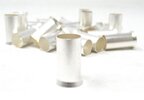I am in the process of attempting to connect the six (6) gauge wires to the weird (to me) terminal block on the back of the amp. There must be a better method. Inserting the wires into the rectangle openings and securing the wires with the small 8-32 / 10-24 screws will cause splitting of the wire strands and I am concerned about possible poor connection and contact.
I have the Anderson Powerpole connectors for the opposite end. This is not my amp and I sure as heck do not want to cause damage due to amp. Is there such a thing as a solder type rectangle male connector / adapter to fit into the OEM receptacle?
I have the Anderson Powerpole connectors for the opposite end. This is not my amp and I sure as heck do not want to cause damage due to amp. Is there such a thing as a solder type rectangle male connector / adapter to fit into the OEM receptacle?



